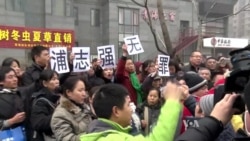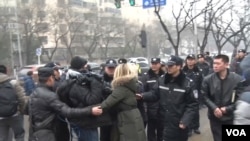A small group of supporters of prominent rights lawyer Pu Zhiqiang rallied outside a Beijing courtroom Monday, despite intimidation from authorities who harassed journalists and pushed around protesters and foreign diplomats outside the trial.
If found guilty in the highly controversial free speech trial that has drawn widespread criticism from rights groups and western powers, Pu could face up to eight years in prison. His crime: publishing several social media messages that were critical of the government and officials.
The hearing on Monday lasted a little more than three hours. Pu’s lawyer Mo Shaoping says that during the hearing, Pu continued to insist on his innocence, arguing that the postings he made are protected under China’s constitutional guarantees to free speech.
Pu also said that if any were offended by what he wrote, he was willing to apologize. Mo says Pu is asking the court for a “verdict that stands the test of history.”
It was not immediately clear when the verdict will be announced, but Pu’s lawyer says a ruling should come soon.
A U.S. State Department spokesman, John Kirby, urged Chinese authorities to release Pu, saying he should not be subject to continuing repression. "We remained concerned that Pu Zhiqiang, a prominent Chinese defense lawyer, is being tried under vague charges of inciting ethnic hatred and picking quarrels and provoking trouble," he said.
Open Hearing?
Chinese authorities said the trial was open to the public but the scene at the courtroom suggested otherwise. Diplomats from the United States, the EU, Germany, New Zealand, Australia and Britain were among those who tried to attend the trial. They were told the courtroom was “too full.”
Police started physically removing people from the entrance to the courtroom just as the trial was to begin.
One supporter continued to speak out even after he was pushed down.
“We want freedom of speech, democracy and peace,” he said, sitting on the wet pavement with his arms outstretched.
A plainclothes security agent wearing a facemask shoved Philip Wen, the China correspondent for the Sydney Morning Herald, to the ground. When reporters tried to interview a U.S. diplomat outside, he, too, was pushed around.
Like many others, this VOA correspondent was shoved and yelled at numerous times. In one instance, a plain-clothes policeman grabbed me by my neck and shoved me forward. Police in several instances rushed into tight crowds, causing reporters and others to stumble over one another.
Shortly after the scene outside the courtroom occurred, the Foreign Correspondents Club of China issued a statement, condemning “the harassment and violence against overseas media and their local staff.”
Several members of the club also reported that police demanded impromptu meetings with them at the same time the trial was getting under way, in a bid to prevent their coverage, it said.
“This effort to deter news coverage is a gross violation of Chinese government rules governing foreign correspondents, which expressly permit them to interview anybody who consents to be interviewed,” the statement said. “Legal coverage is a normal part of journalistic work and is expected to grow as China pushes to develop its rule of law.”
U.S. State Department spokesman Kirby said the United States is "dismayed with the physical harassment of Chinese and international observers, including journalists and diplomatic personnel outside the courthouse."
Chinese authorities argue that tight controls are needed to keep such situations from getting out of control or to prevent large crowds from gathering, but their actions only fueled the frustration of journalists trying to do their work and emboldened those who had come to show their support. Later Monday, China's foreign ministry said police outside the trial acted within the law.
Small Protest
Authorities' actions also attracted more attention from onlookers and slowed traffic in front of the court to a near standstill. One sidewalk leading up to the court was blocked off by what appeared to be a newly installed metal fence that had makeshift signs on it that read: “We apologize for the inconvenience this construction has brought.” Behind the fence, wood was strewn on the sidewalk, in an apparent attempt to make it seem as if construction was ongoing.
At one point, after being shoved back more than a block, supporters of the rights lawyer gathered together and chanted loudly: “Pu Zhiqiang is innocent!” and “Free speech.”
Some raised small signs with the same message before plainclothes police rushed in to snatch the pieces of paper from their hands.
Online authorities were busy as well, censoring postings about the trial. One posting that was circulating on social media featured a picture of Pu Zhiqiang with his lips zipped shut.
Rule of Law on Trial
For many, the trial was a sign of just how far China still has to go when it comes to establishing the rule of law. China’s President Xi Jinping has stated that establishing the rule of law is a key goal. However, that message is contradicted by the Communist Party's insistence that it is above the law.
For those who came out to show their support, it was clear that for them the courts and rule of law are on trial, not Pu Zhiqiang.
“What we want is for the trial to be open to the public so it can see whether this country really has rule of law or not… that is the most important thing here,” said one supporter.
Many said they did not know Pu personally, some did not even know the specifics of his trial, but most said they were drawn to the courtroom because of his work in the past and as someone who is being oppressed by the country's legal and political system.
“Pu speaks for grassroots people in China. If he is found guilty, it will be a blow to justice and democracy," said one supporter surnamed Zhang from China’s Liaoning province.
Dan Biers, the deputy political counselor at the U.S. Embassy, was among the diplomats who tried to attend the trial. He called for Pu’s release and criticized the “vague” charges that are being used in the trial.
“Lawyers and civil society leaders, such as Mr. Pu, should not be subject to continuing repression, but should be allowed to contribute to the building of a prosperous and stable China,” Biers told reporters after a first attempt to read a statement was interrupted by shoving from police.







